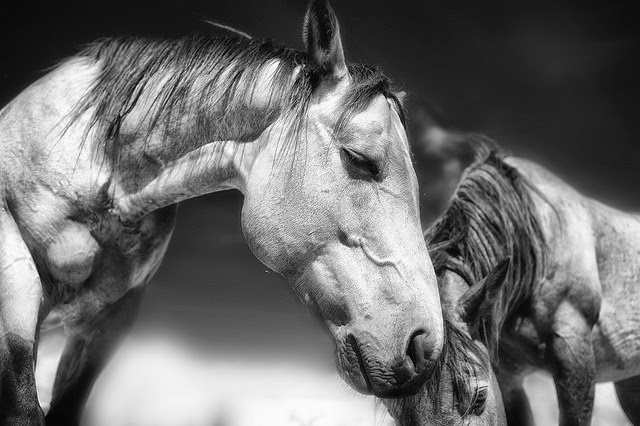This morning someone asked me:
What makes a scene gripping? What characteristic, more than any other, draws a reader into a story?
A number of answers sprang to mind: suspense, deep characterization, an intricate plot. Most of all, though, I look for an intriguing voice.
Hemingway's voice is minimalist, stark, intriguing. Chuck Wendig's voice, on the other hand, is loud, sonorous, poetic, startling.
Sometimes I think a writer's voice is the single most important thing for pulling me into a story. But, of course, one's voice--what makes a voice compelling--is all bound up with developing character and fleshing out setting.
Examples of a strong voice
"The woman brought two glasses of beer and two felt pads. She put the felt pads and the beer glasses on the table and looked at the man and the girl. The girl was looking off at the line of hills. They were white in the sun and the country was brown and dry."
Terry Pratchett, Going Postal:
"They say that the prospect of being hanged in the morning concentrates a man’s mind wonderfully; unfortunately, what the mind inevitably concentrates on is that, in the morning, it will be in a body that is going to be hanged."
Stephen King, Misery:
"Then there was a mouth clamped over his, a mouth which was unmistakably a woman's mouth in spite of its hard spitless lips, and the wind from this woman's mouth blew into his own mouth and down his throat, puffing his lungs, and when the lips were pulled back he smelled his warder for the first time, smelled her on the outrush of the breath she had forced into him the way a man might force a part of himself into an unwilling woman, a dreadful mixed stench of vanilla cookies and chocolate ice cream and chicken gravy and peanut-butter fudge."
I picked those three examples because I loved them, their meter, their flow, their rhythm, and because they are from books I couldn't put down (though it took me a while, quite a while, to recover from reading Misery.)
Chuck Wendig is another writer with a voice that jumps out and grabs you (or pushes you down a stairwell, whichever). I find his voice big, bold and startling. Wonderful. If you'd like to sample it, try this excerpt from the start of his serialized story, The Forever Endeavor, over at Tor.com. (Note: Chuck Wendig's work usually comes with a NSFW warning.)
The elements of voice
Voice is a bit like a criminal's signature. It's something that you do even when you don't want to do it. It's a part of you, a part of the way you think, a part of the way you write.
What makes one voice different than another? Good question. On one level, simple things like sentence length--and how that difference ricochets through a work. In the examples I gave, above, look at how short Hemingway's sentences are compared to either King's or Pratchett's.
"The traditional definition of a writer’s 'voice' is, simply put, that writer’s chosen style. 'John Q. Snarlmonkey writes with snark and panache, using tons of ellipses and lots of capital letters and made-up words. I love Snarlmonkey’s voice.' Voice equals style. That’s the easy answer."
Here's a more difficult one:
"The writer’s voice is the thing that marks the work as a creation of that writer and that writer only. You read a thing and you say, 'This could not have been written by anybody else.' That is voice."[1]
Stephen King has a distinctive voice, one that is his and his alone. Many of King's fans who read Richard Bachman's work recognized King behind the pseudonym long before he was outed.[2]
Developing your own voice
Developing one's voice is a dark art. It happens, somehow, but no one is quite sure how, except that it has a lot to do with writing (a lot) and reading (a lot).
I agree with what Chuck Wendig said at the end of his article, that you have to write with confidence. I would add, though, that if you can't write with confidence--after all, in the beginning confidence can be difficult to come by--write with resignation.
Resignation that, ultimately, there is one way of writing that defines you, one way that feels more natural than any other.[3] That's scary because what's going to happen if your friends, your family, don't like that style? What happens if it turns out your style is shocking? Unconventional?
I think that developing one's own style takes brashness. A writer needs to lock up the jabbering, naysaying, sensible, reasonable voices that urge caution and, instead, dip her pen in the blood of her fears and phobias and insecurities and lay herself bare on the page.
No wonder artistic types are a bundle of nerves.
Links/References
1. 25 Things Writers Should Know About Finding Their Voice, by Chuck Wendig over at Terribleminds.com.
2. "The link between King and his shadow writer was exposed after a Washington, D.C. bookstore clerk, Steve Brown, noted similarities between the writing styles of King and Bachman." (Richard Bachman over at Wikipedia.org).
3. I think that developing one's own style, one's own voice, has a lot to do with the idea of soul, or of whatever it is that makes a person unique. Yes, writers can intentionally mimic the styles of others but, at the end of the day, the way a person writes either grows out of all those inky, inconvenient, personal, individual, aweful-and-exhilerating things that make a person that person, or they turn away from the terror and play it safe. I think we've all played it safe, but when we do our best work we face the terror.


Some great examples of voice here. It's one of those things that's easier to identify than it is to work out how it's done (unfortunately).
ReplyDeletemood
Moody Writing